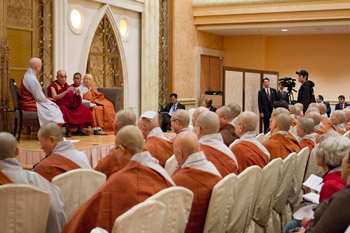
His Holiness the Dalai Lama in Yokohama: “We all know the value of thinking holistically, but often we don’t do it, because we’re thinking only of the moment.”
His Holiness the Dalai Lama’s second day in Yokohama
Tokyo, Japan, 5 November 2012 – “China needs Japan, Japan needs China,” said His Holiness as he faced a group of 20 or so reporters, both Japanese and international, in a conference room in a hotel in Yokohama. “East needs West, and West needs East. Every country on this planet needs others. So a small disagreement or divergence of interests should not affect basic relations. That’s short-sighted, narrow-minded. We should think more broadly.” On the second day of his 18th trip to Japan, His Holiness was, inevitably, facing questions from the press about Japan’s recent disputes with China. Asked whether he thought democracy was the best system of government, he looked around the sun-flooded room, overlooking a huge Ferris wheel and the forest of tall grey skyscrapers that overlook Yokohama’s Bay, and acknowledged that democracy wasn’t perfect, but stood more to reason than other political systems. “The world belongs to humanity,” he said. “Different nations belong to their peoples. So the best way to rule any country is by popularly elected leadership.”His Holiness had begun his day with a series of audiences in which he stressed the importance of being a 21st century Buddhist, “which means Buddhist faith with a fuller knowledge of the Buddhist system and modern science.” Work hard, he stressed; and don’t take Buddhism as just a set of rituals or gestures. One kind of emotion, he pointed out, arises out of reason, logic and analysis, and generates compassion; another rises out of hatred or fear, and takes us away from objective reality, the way things really are. Buddhists should pay more attention, he said, to such questions as `What is Buddhism? What is Dharma? What is self?’ “ They shouldn’t ignore emotion, but should work on eradicating those emotions that are divisive and destructive. There is always a value in challenges, he stressed—“If there is no challenge, there is no chance for development”—and in the virtue of taking a wider viewpoint. “When we were in Tibet, we sometimes said, `Tibet is the best.’ That’s wrong! Too much emotion involved! In the past, I sometimes told people Buddhism was the best. But after meeting with different people, from other traditions, I came to feel you can’t say any religion is best. They’re like different systems of medicine. In order to administer medicine, you have to look at the case in hand. For each patient, according to his circumstances, his material conditions, a different medical system might be appropriate.”
Again and again, on this day of mostly private meetings, he came back to root causes, which often meant education. “How do you get people to do the right thing?” a journalist from Korea asked, early on in the press conference. “We all know the value of thinking holistically, but often we don’t do it, because we’re thinking only of the moment.”
“Ultimately,” said His Holiness, “it depends on education. Our existing educational system often doesn’t pay adequate attention to moral principles. We can’t blame the present generation; their education puts too much emphasis on their immediate interests.” The only way truly to deal with problems, he was saying, whether in the self or in the world, was to take in the larger view and see the interconnectedness of all things and their causes. With those vigorous words, delivered with good humor and passion, he got in a car to go to Tokyo, less than an hour away, for the central point of his current trip to Japan: an unprecedented series of dialogues with scientists.
http://www.dalailama.com/news/post/873-his-holiness-the-dalai-lamas-second-day-in-yokohama